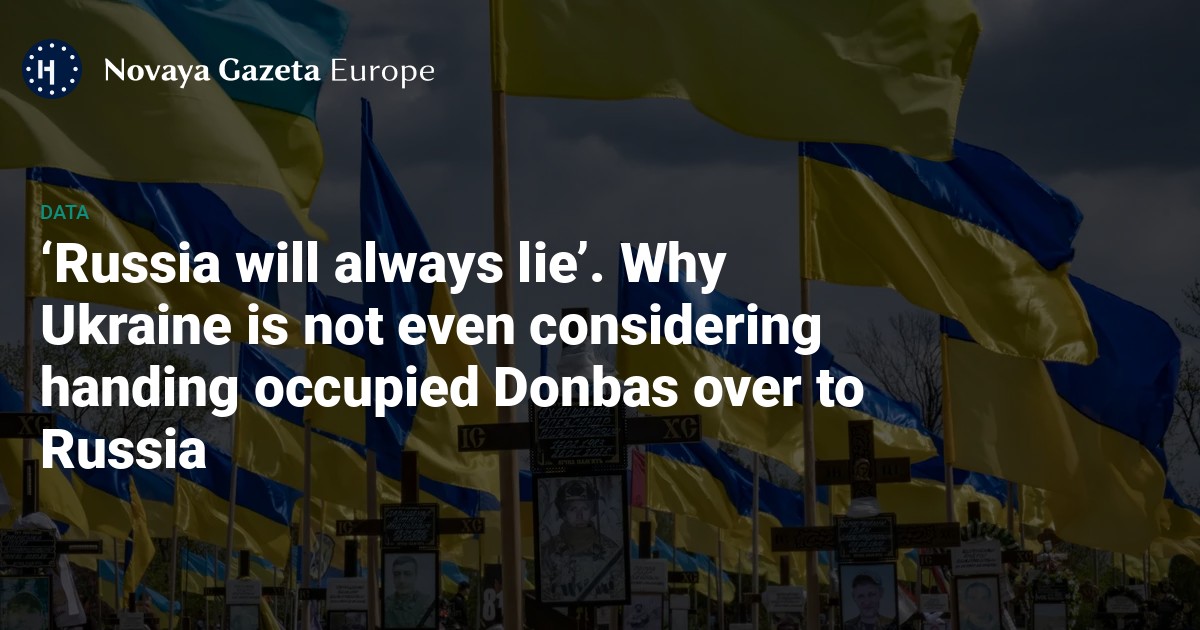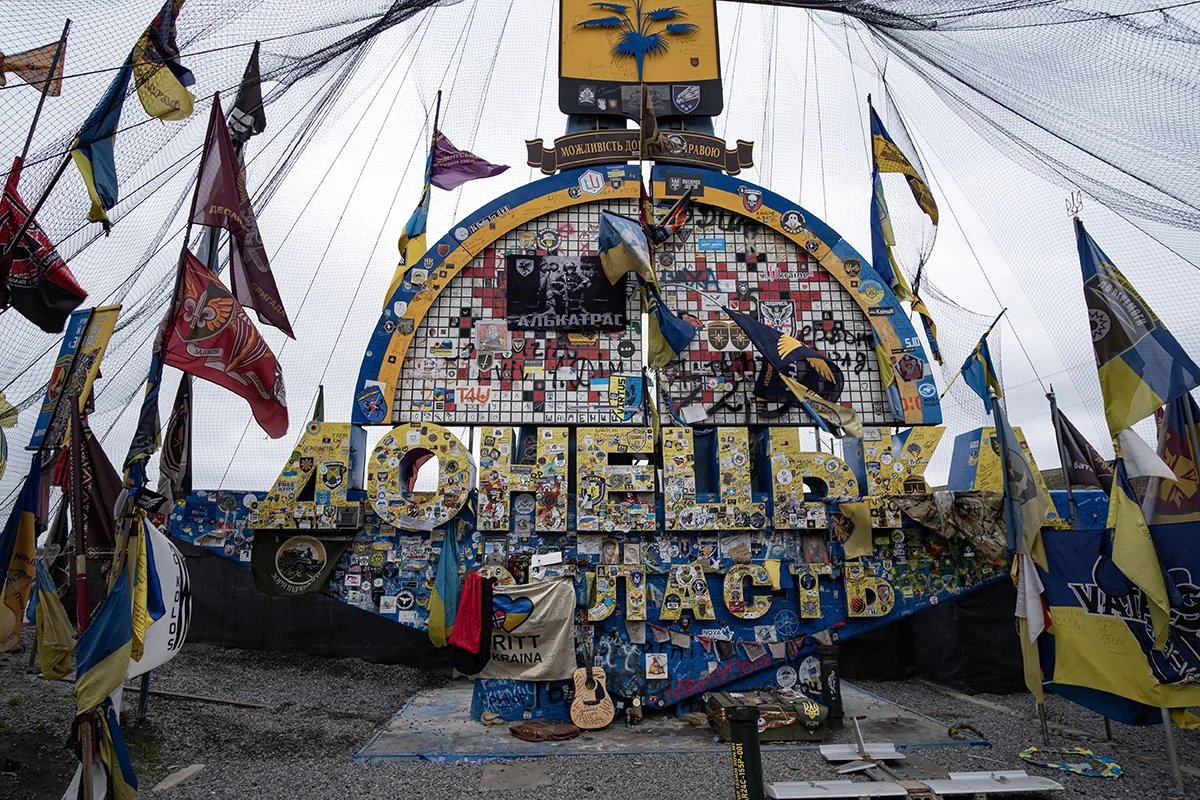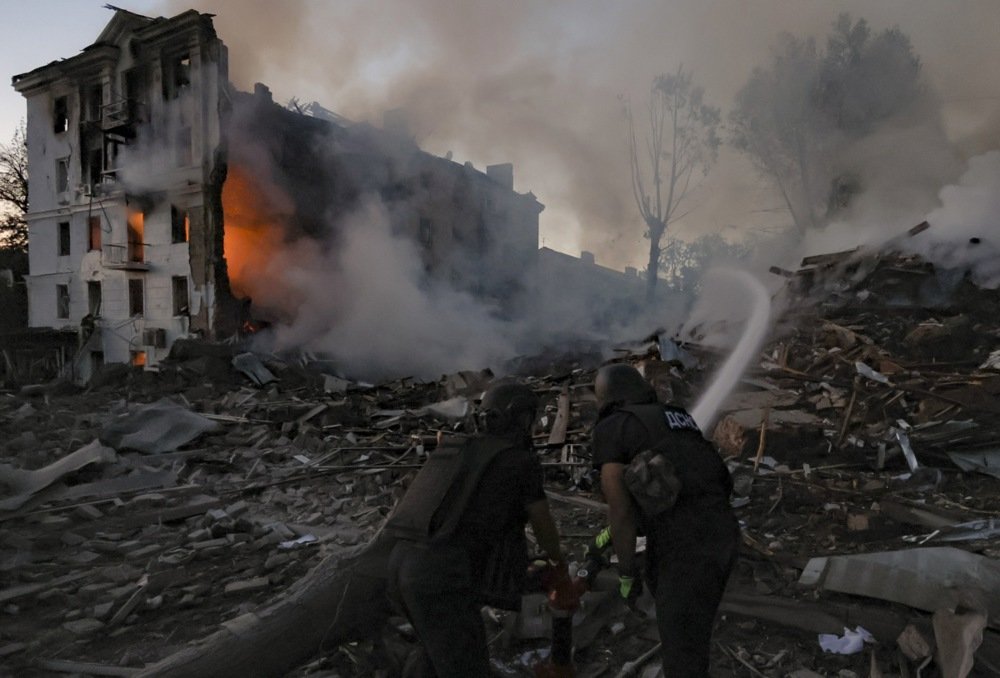



With US President Donald Trump and Vladimir Putin due to meet in Alaska on Friday, rumours abound that Moscow might consider declaring a ceasefire in exchange for Kyiv’s withdrawal from Ukraine’s Donetsk region.
Meanwhile, Kyiv has repeatedly reminded the world that its constitution prohibits the alteration of the country’s borders without a national referendum, and that Ukrainians would not simply cede Donbas to Russia, as Ukrainian opinion polls show that a majority of locals oppose such a move. Meanwhile, military experts continue to urge all parties involved not to trust any promises made by the Russians.
European leaders appeared cautiously optimistic about the upcoming Alaska summit following a video call with Trump on Wednesday. According to French President Emmanuel Macron, Trump agreed that territorial issues could only be negotiated by Ukrainian President Volodymyr Zelensky, and that there were currently “no serious territorial exchange schemes on the table”.
Nevertheless, concerns remain about whether Trump should be taken at his word after saying on Monday that he planned to discuss “land swapping” between Russia and Ukraine, hinting that both countries would need to make territorial concessions to end the war.
Speaking about his upcoming meeting with Putin at a White House press conference, Trump said any peace settlement would involve “changes in land” — including “some bad stuff for both” countries — but also suggested he would try to persuade Putin to abandon Russia’s claims to at least part of the Ukrainian territory it currently occupies.
The Ukrainian Constitution expressly forbids the president from unilaterally authorising territorial changes.
Meanwhile, an unnamed Western official told The Telegraph on Monday that Zelensky could agree to cede territory already held by Russia — namely, freezing the frontline where it is — in exchange for weapons deliveries and a path to NATO membership.
However, the Ukrainian Constitution expressly forbids the president from unilaterally authorising territorial changes. The constitution stipulates that the territory of the country is integral and inviolable, the protection of its sovereignty the most important function of the state, and that any changes in territory can only be resolved by a national referendum called by the country’s parliament, the Verkhovna Rada.
Zelensky, in turn, has repeatedly said he would not agree to territorial concessions. “The answer to the Ukrainian territorial issue is in the constitution. No one will or can escape that. Ukrainians will not gift their land to the occupier,” he said in a video address on Saturday.

Ukrainian flags on the border of the Donetsk region on 6 April 2025. Photo: Maria Senovilla / EPAx
Sovereignty over Donbas, made up of Ukraine’s Donetsk and Luhansk regions, is non-negotiable for most Ukrainians. According to recent opinion polls, 52% of Ukrainians are categorically opposed to any territorial concessions in exchange for peace, while 38% are open to compromise. Furthermore, 68% of respondents rejected the Ukrainian recognition of Russia’s control over its occupied territories, while 78% opposed concessions regarding any territories still controlled by Ukraine.
“It is inconceivable that the Ukrainian president could sign such proposals and then return to the country,” independent Ukrainian journalist Dmytro Durnev told Novaya Gazeta Europe.
Donbas makes up about 9% of Ukrainian territory, and the war there has been going on for over 10 years, ever since armed clashes between Ukrainian forces loyal to Kyiv and Russian-backed separatist groups broke out in the spring of 2014.
“Russia will always lie. Russia does not stick to any treaty and does not fulfil any agreement.”
According to the UN Human Rights Office, somewhere between 14,200 and 14,400 people, including at least 3,404 civilians, were killed in eastern Ukraine between 14 April 2014 and 31 December 2021.
The numerous Minsk agreements seeking to end the war that have come and gone are further reasons why nobody in Ukraine has any faith in Russia’s latest proposals, Durnev said, adding that there was “a clear understanding that Russia cannot be trusted. Russia will always lie. Russia does not stick to any treaty and does not fulfil any agreement.”

Ukrainian rescuers fight a fire in a five-storey residential building in the Donetsk region city of Kramatorsk following a Russian airstrike, 31 July 2025. Photo: EPA/YEVHEN TITOV
Durnev says that the Ukrainian soldiers he spoke to had only been open to a temporary ceasefire along the front line, but even so had been dubious about its chances of success given that Russia “would not adhere to it”.
According to Durnev, Ukrainian soldiers believe that Russia would immediately launch a fresh attack on Ukrainian positions after agreeing to a temporary ceasefire, so they should now be focusing on strengthening their positions by procuring additional drones and mines.
Durnev added that “negotiations which hand over Ukrainian land to Russia will immediately cause popular unrest”.
Ivan Stupak, a Ukrainian military analyst and former secret service officer, stressed that pausing the fighting along the front line would theoretically be possible, but that there could be no question of Kyiv legally recognising Russian-occupied territories, given that “Ukraine will not abandon its diplomatic efforts” to bring about their return.
Soldiers in the Ukrainian army, in turn, have an “unequivocal” stance on laying down arms and abandoning positions to cede territory to Russia, says Ukrainian reserve colonel Roman Svitan. “Anyone who gives such an order would simply be called a traitor and shot.”
While Leonid Pasechnik, the Moscow-appointed head of the occupied Luhansk region, claims that Russia currently controls the entire region, the US-based Institute for the Study of War reports that Ukrainian troops are currently advancing in Novoiehorivka, on the eastern side of the Luhansk region. Meanwhile, Russian forces only occupy about 70% of the neighbouring Donetsk region.
Stupak says that Ukrainian defences are “sagging” rather than collapsing in Donbas and that the most dangerous conflict hotspot is currently Pokrovsk, a city in the east of the Donetsk region which he estimates will have to be abandoned by Ukrainian forces in the next two months.
Meanwhile, the Armed Forces of Ukraine (AFU) are continuing to maintain defensive positions in the cities of Toretsk, Chasiv Yar, and Kostyantynivka, all of which are further east than Pokrovsk, despite a serious shortage of personnel that should be reinforced with “motivated and professionally trained soldiers”, according to Svitan, who suggested training up to 150,000 law enforcement officers and other security personnel currently serving in the rear.
“The front will not crumble, and the defence will continue to hold out.”
Ukraine is also facing a serious threat in the Dnipropetrovsk region, to the west of the Luhansk and Donetsk regions, where Russian troops are advancing. According to Stupak, the AFU are now attempting to organise “so-called kill zones in the most difficult areas, where any enemy equipment and personnel are destroyed using drones”.
While Stupak says that more personnel are required, he reports that the resources are currently sufficient, as 40% of weapons and ammunition are produced inside Ukraine and Kyiv’s Western partners supply missiles for anti-aircraft systems. However, should the US cut off its supply of weapons to Ukraine and impose restrictions on the use of US fighter jets, this would have a painful impact on Ukraine’s defences in the rear.
Despite this, Stupak says he remains certain that “the front will not crumble, and the defence will continue to hold out.”
The Russian government has banned independent media. We were forced to leave our country in order to keep doing our job, telling our readers about what is going on Russia, Ukraine and Europe.
We will continue fighting against warfare and dictatorship. We believe that freedom of speech is the most efficient antidote against tyranny. Support us financially to help us fight for peace and freedom.
By clicking the Support button, you agree to the processing of your personal data.
To cancel a regular donation, please write to [email protected]
VPNovaya
Help Russians and Belarusians Access the Truth
